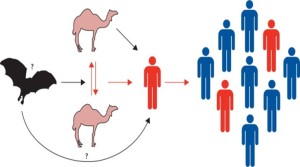
MERS Virus in camels: Understanding the Link and Ensuring Public Health
Middle East respiratory syndrome (MERS) is a viral respiratory infection that is caused by a coronavirus called Middle East Respiratory Syndrome Corona Virus (MERS-CoV). Humans are infected with MERS-CoV from direct or indirect contact with dromedary camels who are the natural host and zoonotic source of the MERS-CoV infection. MERS-CoV infections range from asymptomatic or mild respiratory symptoms to severe acute respiratory disease and death. MERS-CoV has demonstrated the ability to be transmitted between humans. So far, the observed non-sustained human-to-human transmission has occurred among close contacts and in healthcare settings. Outside of the healthcare setting, there has been limited human-to-human transmission. Cases of MERS-CoV infection are rare in the UAE. Since July 2013, a total of 94 MERS-CoV cases, resulting in 12 deaths (CFR 13%) have been reported to WHO from the UAE. WHO expects that additional cases of MERS-CoV infection will be reported from the Middle East and/or other countries where MERS-CoV is circulating in dromedaries, and that cases will continue to be exported to other countries by individuals who were exposed to the virus through contact with dromedaries or their products (for example, consumption of camel’s raw milk), or in a healthcare setting.
Regular surveillance of MERS-CoV in camel populations is essential for early detection and monitoring of the virus. Surveillance programs often involve sampling camels at markets, slaughterhouses, or during outbreaks to identify and control the spread of the virus. Detecting MERS-CoV in camels is critical for preventing human infections and managing the spread of the virus. The PCR test is used to detect and diagnose infectious disease and can confirm positive cases of MERS-CoV in camels. However, PCR test is time consuming, at Fujairah Research Centre rapid MERS- CoV ag test kit has been used to provide fast and reliable test results of MERS-CoV ag with high correlation RT-PCR. It can be used as screening test for large number of camels. The nasopharyngeal swab/Sputum specimen collected and examine by MERS-CoV Ag test kit with sensitivity (93.9%) and specificity 99.6%. As a general precaution, anyone visiting farms, markets, barns, or other places where dromedaries are present should practice general hygiene measures, including regular hand washing after touching animals, avoiding touching eyes, nose or mouth with hands, and avoiding contact with sick animals. People may also consider wearing protective gowns and gloves while professionally handling animals. The consumption of raw or undercooked animal products, including milk, meat, blood, and urine, carries a high risk of infection from a variety of organisms that might cause disease in humans. Animal products processed appropriately through proper cooking or pasteurization are safe for consumption but should also be handled carefully to avoid cross-contamination with uncooked foods.
